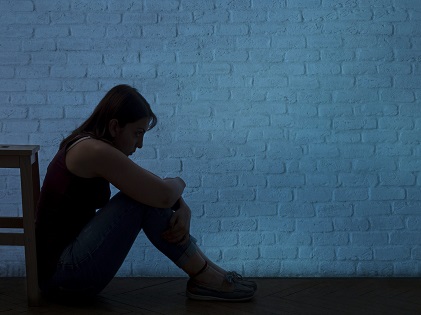
Teenagers and Mental Health – All You Need to Know as a Parent!

 Teenagers are difficult to deal with. This is a generalized statement that almost every parent might have used at some point in their lifetime. And why not, the teenagers are going through a tough phase themselves trying to understand the various aspects of their life and the world around them. From puberty to an identity crisis, they have a lot of issues to battle and things to figure out. That’s probably a reason why they are hard for everyone else to understand.
Teenagers are difficult to deal with. This is a generalized statement that almost every parent might have used at some point in their lifetime. And why not, the teenagers are going through a tough phase themselves trying to understand the various aspects of their life and the world around them. From puberty to an identity crisis, they have a lot of issues to battle and things to figure out. That’s probably a reason why they are hard for everyone else to understand.
So, if you are a parent to a teenager too, and having a tough time handling them, think again and understand what they might be going through. Several research findings suggest that teenagers might be battling numerous mental health issues or might be vulnerable to a lot of mental health challenges. Here are six mental health battles that teenagers are most susceptible to. So, here is how you could help them deal with it.
Eating Disorders
 Body image issues are common struggles that adolescents and teenagers tend to battle. This could be anything from anorexia to anorexia, bulimia nervosa, or other binge eating disorders. At the same time, the common perception is that only girls and women who battle eating disorders. However, this is not the truth, as research evidence shows otherwise. It has numerous serious psychological and physical consequences of a person. A common sign of an eating disorder could be anything from excessive eating to not eating at all, and both do more harm than good to the individual.
Body image issues are common struggles that adolescents and teenagers tend to battle. This could be anything from anorexia to anorexia, bulimia nervosa, or other binge eating disorders. At the same time, the common perception is that only girls and women who battle eating disorders. However, this is not the truth, as research evidence shows otherwise. It has numerous serious psychological and physical consequences of a person. A common sign of an eating disorder could be anything from excessive eating to not eating at all, and both do more harm than good to the individual.
If your teenager seems to be having an eating disorder, the first step you should take is to accept their problem and not treat it as something they’re choosing to do. Instead, you can help them visit a therapist and let the professional guide them towards the solution.
Social Anxiety
Social phobia or social anxiety is one of the most common mental health disorders that people battle. This is all the more true in the case of teenagers. People with social anxiety are in constant fear of social interactions. They have irrational anxiety, very self-conscious in social situations and interactions. This excessive fear of being judged and humiliated makes it difficult for them to carry on with everyday life activities. It is rightly called social phobia.
Just the way any other phobia triggering objects makes life difficult, a social phobia makes it difficult for people to deal with social situations. If you think your teenager has social anxiety issues, watch for symptoms like anxiety, social isolation, sweating, or palpitations. You could consider taking your child to a therapist where they can talk about their feelings and improve their ability to talk and deal with social situations. A professional might also prescribed antidepressants if the situation demands it.
Depression
 Depression is a serious mood disorder that impacts a person’s life significantly. A series of symptoms categorized as depression are sadness, feeling low, a sense of loss, anger, and a feels a lack of control over situations. A severe case of clinical depression could also make it difficult for the individual to deal with everyday life. Depression could be of many types. Understanding which one your teenager might be battling is important to help them deal with it rightly.
Depression is a serious mood disorder that impacts a person’s life significantly. A series of symptoms categorized as depression are sadness, feeling low, a sense of loss, anger, and a feels a lack of control over situations. A severe case of clinical depression could also make it difficult for the individual to deal with everyday life. Depression could be of many types. Understanding which one your teenager might be battling is important to help them deal with it rightly.
If your child is experiencing extreme mood swings, it could be a sign of bipolar disorder or maniac depression where a person’s moods keep switching between mania and depression. In this condition, the person has moments of high energy, followed by extremely high depression. At the same time, the major causes of depression could be past abuse, which could have been physical, sexual, or emotional. A psychologist might suggest a series of therapy sessions and medications or a combination of both to help your teenager battle their mental health issue.
These are just three of the major mental health issues that most teenagers battle. However, these are not all. If you see your child having difficulty adjusting to situations, be patient with them. Always lend a listening ear and a shoulder to cry on. Stay by their side and help them understand that you are in this with them. Besides that, tell them that they can get the right counseling, which will help them overcome their battles.
More in Relaxation
-
`
Jennifer Aniston’s Timeless Tips for Health and Youthfulness
Iconic Hollywood actress Jennifer Aniston has long been admired for her acting prowess and seemingly ageless beauty and vitality. Now in...
November 22, 2023 -
`
Unleash Your Entrepreneurial Drive: 5 Strategies for Self-Motivation
5. Have an Undying Passion Passion is the driving force behind the world’s most successful entrepreneurs. Self-motivation becomes second nature when...
November 19, 2023 -
`
How to Go Vegan – The Right Way!
The vegan lifestyle has seen a significant surge in popularity lately, and rightly so. Embracing veganism not only fosters personal health...
November 12, 2023 -
`
7 Eye-Opening Reasons to Drink More Water
Water is frequently hailed as the quintessential elixir for life, and rightfully so. Constituting approximately 60% of our total body weight,...
November 1, 2023 -
`
Drake’s Workout Regimen: How the Canadian Rapper Stays Fit
The lights dim, the stage is set, and the crowd’s anticipation is palpable. When the beat drops, there is one Canadian...
October 24, 2023 -
`
Why Six-Figure Family Holidays Are Becoming the New Normal
In the panoramic landscape of the modern travel scene, a particularly glittering trend is emerging, akin to finding a diamond the...
October 21, 2023 -
`
Foods With High Water Content
Water is the elixir of life, and staying adequately hydrated is crucial for maintaining our health and well-being. While sipping on...
October 15, 2023 -
`
The Impact of Wearable Technologies in Health Research
In recent years, wearable technologies have emerged as a powerful tool in health research, revolutionizing how we collect and analyze data...
October 3, 2023 -
`
How Celebrities Stay Fit? Secrets of Chris Pratt, Jennifer Lopez & More
The glitz and glamor of Hollywood may make it seem impossible for celebrities to maintain an enviable physique. But it is...
September 29, 2023















You must be logged in to post a comment Login